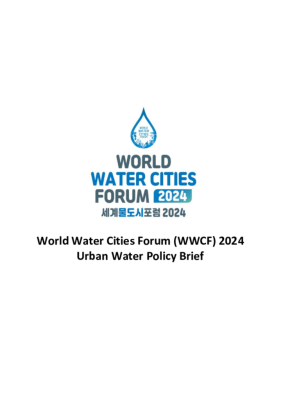World Water Cities Forum (WWCF) 2024 Urban Water Policy Brief

Policy Brief
Pages
16
Languages
English
Measures for Enhancing Water Security in Urban Areas to Address the Climate Crisis
- Proactive Strategies for Urban Water Security: Cities must safeguard urban water security by enhancing water quality, flood control measures, and sustainable water use while adopting resilient infrastructure to address climate change challenges.
- Technological Integration: Advanced monitoring systems (IoT, AI-powered sensors) and climate-resilient infrastructure (flood barriers, green rooftops) are essential for real-time water quality and availability management.
- Circular Water Economy: Policies encouraging wastewater reuse and recovery of energy and nutrients can reduce dependence on freshwater resources.
- Groundwater and Disaster Preparedness: Green infrastructure for groundwater recharge and predictive models for water-related disasters enhance resilience.
- Capacity Building and Public Engagement: Capacity-building programs for planners and engineers, alongside public campaigns, promote sustainable water practices.
The Role of Local Governments in Promoting the Water Industry
- Platforms for international cooperation and knowledge exchange: Municipalities enhance international partnerships by hosting water-related events and participating in global forums, fostering collaboration and knowledge exchange in the water sector.
- Catalysts for Innovation and Partnerships: Local governments play a vital role by fostering public-private partnerships (PPPs), supporting water-related innovation clusters, and hosting global water events to strengthen international cooperation.
- Public-Private Partnerships for Resource Optimization and Practical Solutions: PPPs, with private operators working under public contracts with transparent performance indicators, offer practical, results-oriented options and solutions for local authority leaders wanting to make the best use of resources.
- Smart Water Systems: Adopting AI, IoT, and smart management systems enhances predictive maintenance, leak detection, and operational efficiency in urban water services.
- Economic and Financial Support: Municipal bonds, green financing, and simplified regulatory frameworks enable investment in water infrastructure while attracting global technology partners.
- Localization of Global Goals: Adapting global SDGs to local challenges ensures sustainable development, resource optimization, and community involvement in water management.
WWCF_2024_Urban_WaterPolicy_Brief.pdf
363.59 KB
